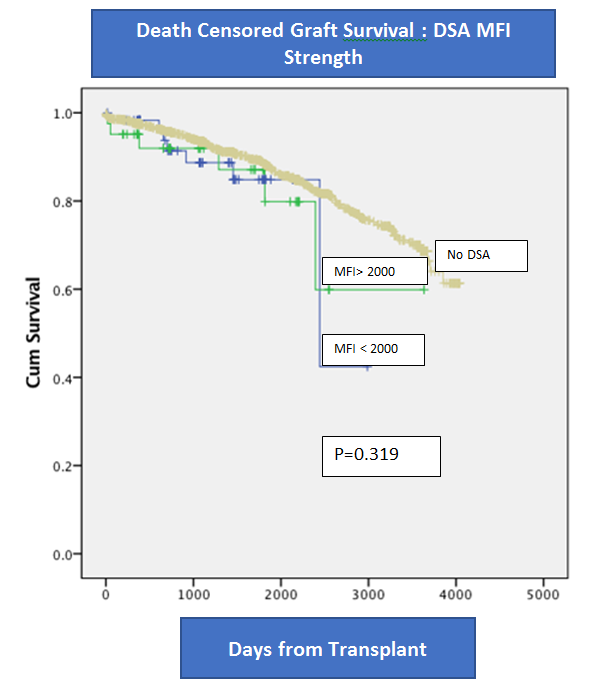Clinical Impact of Strength and Class of Pre transplant Donor Specific Antibody on Kidney Transplant Recipient Receiving Steroid Free Maintenance Immunosupression Regimen.
Renal Transplant, Indiana University School of Medicine, Indianapolis, IN
Meeting: 2017 American Transplant Congress
Abstract number: D70
Keywords: Flowcytometry crossmatching, HLA antibodies, Kidney transplantation, Rejection
Session Information
Session Name: Poster Session D: Kidney Immunosuppression: Novel Regimens and Drug Minimization
Session Type: Poster Session
Date: Tuesday, May 2, 2017
Session Time: 6:00pm-7:00pm
 Presentation Time: 6:00pm-7:00pm
Presentation Time: 6:00pm-7:00pm
Location: Hall D1
Background: The class and strength of pre- transplant DSA has been described as playing a role in determining future risk of acute rejection (AR) and kidney allograft failure in few studies. These studies were mostly done on patient placed on steroid based immunosuppression regimen.
Methods: A retrospective chart review of patients who received a kidney transplant between Jan 1, 2005 and June 31, 2015 with minimal one year follow up. Patients with history of positive crossmatch or multi organ transplant were excluded. Patients received anti- thymocyte antibodies with pulse steroid induction (Early five days withdraw) except zero mismatches who received basiliximab. Patients were placed on steroid free two drugs Immunosupression regimen. Donor specific antibodies were checked using single antigen beads (One Lambda Inc).
Results: 1978 patient's kidney alone patients were included in the study over a 10.5 years' period. Mean follow up was 4.52 +/2.79 years. 101 patients (4.7%) had pre transplant DSA (DSA+, MFI > 500) at time of transplant with negative flow cytometry crossmatch. There was an overall increased risk for AR in DSA+ vs DSA- patients (29.7% vs 18.3%, p=0.0002). Likewise there was an increased rate of AR in patients with DSA MFI >2000 or Class 2 DSA when compared with the DSA- patients (38% vs 15.4% p<0.0001 and 37.5% p=0.0003. Cumulative death censored graft survival was similar with DSA + vs DSA-(p=0.13), DSA Strength (MFI > 2000 vs < 2000 vs No DSA, p=0.319) and DSA Class (0.007). Conclusion: Presence of pre transplant DSA with characteristics of class 2 and MFI strength of > 2000 are associated with increased risk of one year acute rejection in kidney transplant patient receiving steroid free maintenance immunosuppression regimen. However, the higher risk of rejection in this patient cohort did not translate to worse graft outcome in the intermediate term and thus should not be a barrier in the use of steroid free maintenance immunosuppression or to transplant.
Conclusion: Presence of pre transplant DSA with characteristics of class 2 and MFI strength of > 2000 are associated with increased risk of one year acute rejection in kidney transplant patient receiving steroid free maintenance immunosuppression regimen. However, the higher risk of rejection in this patient cohort did not translate to worse graft outcome in the intermediate term and thus should not be a barrier in the use of steroid free maintenance immunosuppression or to transplant.
CITATION INFORMATION: Adebiyi O, Simo O, Hussain S, Mishler D, Goggins W, Taber T, Sharfuddin A, Yaqub M. Clinical Impact of Strength and Class of Pre transplant Donor Specific Antibody on Kidney Transplant Recipient Receiving Steroid Free Maintenance Immunosupression Regimen. Am J Transplant. 2017;17 (suppl 3).
To cite this abstract in AMA style:
Adebiyi O, Simo O, Hussain S, Mishler D, Goggins W, Taber T, Sharfuddin A, Yaqub M. Clinical Impact of Strength and Class of Pre transplant Donor Specific Antibody on Kidney Transplant Recipient Receiving Steroid Free Maintenance Immunosupression Regimen. [abstract]. Am J Transplant. 2017; 17 (suppl 3). https://atcmeetingabstracts.com/abstract/clinical-impact-of-strength-and-class-of-pre-transplant-donor-specific-antibody-on-kidney-transplant-recipient-receiving-steroid-free-maintenance-immunosupression-regimen/. Accessed March 4, 2026.« Back to 2017 American Transplant Congress
